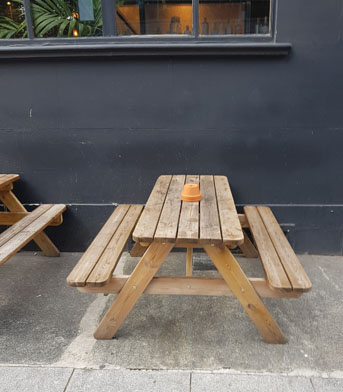Phillipe Chiarella takes the pack of UK driving licences out of a plastic folder, unties the elastic band, and lays the plastic IDs out on the table in front of Professional Security.
We take our own driving licence out of our wallet to compare ours with these fakes of Phillipe’s. They good. So good, you don’t feel like letting go of your genuine one, in case they’re mixed up. If at a first glance in daylight it’s hard to say that an ID is a fake, how much harder will it be for a doorman, in the dark, in front of a queue that may be cold and wants nothing more than to be let into the venue?
Phillipe did show a flaw in the fakes by scratching at the name of one; it came off. Try your own; the surname should make a scratching noise, as the letters are raised slightly from the card. And they certainly ought not to scrape off under your fingernail. It did show that for all the talk of a safe night-time economy – and in London above all, besides other major cities, it’s big business – security and safety of venues (and the official permission to stay open) can come down to quite basic choices. Hence the Safer Sounds Partnership, by the London crime reduction partnership the Safer Business Network, that Phillipe is in charge of. Whereas some at work in the crime partnership field are former police officers, Phillipe has a nightclub background, so knows well how security has to fit in with event promoters and those managing the venue.
He talks Professional Security through Safer Sounds. The aim; to make London by night safer and more vibrant, a place that people want to visit and come back to. As with crime partnership work by day, Safer Sounds seeks to encourage venues, artists, promoters and the mainly contract event and door security companies providing services to work together. Hence a steering group with advisory members from City Hall, the UK regulator of door staff the Security Industry Authority (SIA) and police.
Phillipe’s point is rather that a venue can reduce risk, and have an event allowed by the licensing authorities, by attending to security. Some risks may be simply caused by a crowd, regardless of the type of music and the clientele it attracts; such as pick-pockets (as your typical concert and club-goer, young or old, is each carrying an expensive smart-phone). Venues can usefully share intelligence, not only if known offenders are seen, but ‘softer’ info such as what drugs are around, and how people are trying to smuggle things past the door search and into premises. Phillipe showed a picture of a credit card, that opens to hold drugs. The maker of that product evidently has seen a market. Or; what looks like a computer memory stick, unfolds to become a knife.
Or, door staff may come across cans of deodorant, that in fact stash drugs. In an intriguing case of challenge and response, the obvious way to check if a lady’s spray is genuine has been to ask her to give it a spray. If it won’t, why is she carrying it?! But doors have found cans now engineered so that they do give off a spray. “Front-line door supervisers need to be aware, so they can protect their premises,” Phillipe says.
Next, part two of three: event plan.
Picture by Mark Rowe; Southwark pub bench.










